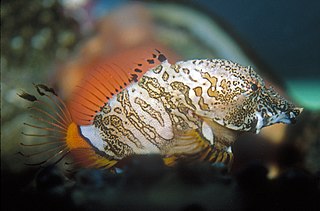
The grunt sculpin or grunt-fish is a small fish mainly found in the eastern Pacific Ocean. The grunt sculpin generally remains close to shore and is often found in empty giant barnacle shells. The common name comes from reports that the fish vibrate or "grunt" when held. Its defining feature is its tendency to “hop” along the ocean floor on its orange fins. The short, stout body of the grunt sculpin has a long, small mouth which is adapted for eating smaller prey.

Rhamphocottus is a genus of marine ray-finned fishes belonging to the family Rhamphocottidae. These fishes are known as grunt sculpins. The grunt sculpins are found in the North Pacific Ocean.

Haemulidae is a family of fishes in the order Perciformes known commonly as grunts. It is made up of the two subfamilies Haemulinae (grunters) and Plectorhynchinae (sweetlips), which in turn contain about 133 species in 19 genera. These fish are found in tropical fresh, brackish, and salt waters around the world. They are bottom-feeding predators, and named for the ability of Haemulinae to produce sound by grinding their teeth. They also engage in mutualistic relationship with cleaner gobies of genus Elacatinus, allowing them to feed on ectoparasites on their bodies.

The brownstriped grunt, also known as the burro, is a species of marine ray-finned fish, a grunt belonging to the family Haemulidae. It is native to the western Atlantic Ocean.

Anisotremus is a genus of grunts native to the eastern Pacific and western Atlantic Oceans. The name of this genus is compound of anisto meaning “different” and tremus meaning “hole”, referring to the different sized paired pores on each side of the head.

Anisotremus virginicus, the porkfish, also known as the Atlantic porkfishsweetlips, dogfish or paragrate grunt, is a species of marine ray-finned fish, a grunt belonging to the family Haemulidae. It is native to the western Atlantic Ocean.

Prionotus is a genus of marine ray-finned fishes belonging to the family Triglidae, one of two genera belonging to the subfamily Prionotinae, the searobins. These fishes are found in the Western Atlantic Ocean and eastern Pacific Ocean, in the waters off both North and South America.

The bluestriped grunt, also known as the boar grunt, golden grunt, humpback grunt, redmouth grunt, or yellow grunt, is a species of marine ray-finned fish, a grunt belonging to the family Haemulidae. It is found in the western Atlantic Ocean.

Haemulon is a genus of fish in the grunt family known as the scaled-fin grunts. Most are found in the western Atlantic Ocean, with a few species known from the eastern Pacific Ocean. This genus is considered to be one of the most important fish groups of the coral reefs of Brazil due to its commercial value and crucial ecological role.

The bigeye grunt is a species of marine ray-finned fish, a grunt belonging to the family Haemulidae. It is native to the Atlantic coast of Africa.

Diagramma is a genus of marine ray-finned fishes belonging to the family Haemulidae, grunts native to the Indian Ocean and the western Pacific Ocean. The currently recognized species in this genus are:
Haemulopsis is a genus of marine ray-finned fish, grunts belonging to the family Haemulidae. They are native to the western Atlantic Ocean and, mainly, to the eastern Pacific Ocean.

Pomadasys is a genus of grunts native to the waters of the eastern Atlantic Ocean and through the Indian Ocean to the Pacific coast of the Americas. The name of this genus is a compound of poma meaning "lid" or "covering" and dasys meaning "rough", a reference to the serrated preopercle.

Xenistius is a genus of grunts native to the eastern Pacific Ocean.

Haemulon chrysargyreum, the smallmouth grunt, bronze grunt, or yellowstripe grunt, is a species of marine ray-finned fish, a grunt belonging to the family Haemulidae. It is found in the western Atlantic Ocean.

Plectorhinchinae, is one of two subfamilies of the family Haemulidae, some known colloquially as sweetlips. This subfamily is regarded as having an Old World origin.

Brachygenys is a genus of marine ray-finned fish, grunts belonging to the family Haemulidae. The species within the genus are found in the eastern Pacific Ocean and western Atlantic Ocean. It is not yet recognised by Fishbase but is by the Catalog of Fishes.
Rhencus is a genus of marine ray-finned fish, grunts belonging to the family Haemulidae. The species within the genus are found in the eastern Pacific Ocean. It is not yet recognised by Fishbase but is by the Catalog of Fishes.

Rhonciscus is a genus of marine ray-finned fish, grunts belonging to the family Haemulidae. The species within the genus are found in the eastern Pacific and western Atlantic Ocean. It is not yet recognised by Fishbase but is by the Catalog of Fishes.

The African striped grunt is a species of marine ray-finned fish, a sweetlips belonging to the subfamily Plectorhinchinae, one of two subfamilies in the family Haemulidae, the grunts. It is found in the eastern Atlantic Ocean.

















